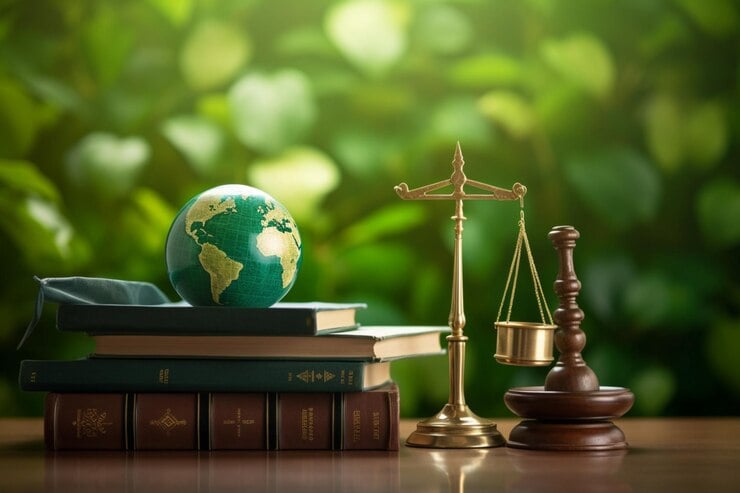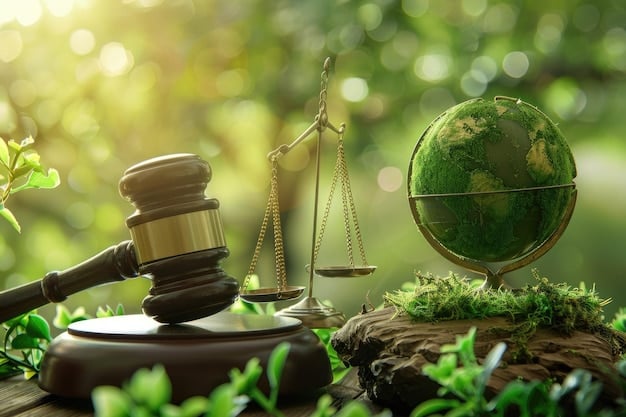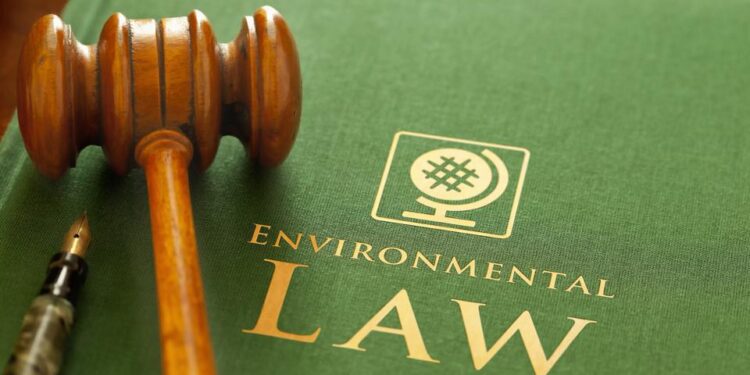The global conversation about climate change, biodiversity loss, and pollution has shifted from a distant concern to an urgent, all-encompassing priority. As a result, Environmental Law’s New Push is a transformative movement that is fundamentally reshaping how governments, corporations, and individuals approach their impact on the planet. This new era of environmental law is characterized by a more aggressive and proactive stance, moving beyond traditional compliance to a focus on accountability, justice, and holistic ecological protection. This article will provide a comprehensive exploration of the key drivers behind this shift, the innovative legal frameworks being developed, and the strategic implications for businesses and societies worldwide. We will delve into critical areas such as climate change litigation, environmental justice, and the push for a circular economy, offering a deep dive into how legal systems are adapting to a world in ecological crisis.
The Evolution from Compliance to Accountability

For decades, environmental law was primarily focused on setting and enforcing regulations, such as pollution limits and protected area designations. While these laws remain crucial, the new push is driven by a demand for greater accountability, holding powerful entities responsible for the environmental damage they cause.
A. Climate Change Litigation: This is one of the most significant and rapidly growing areas of environmental law. Plaintiffs, including governments, environmental groups, and private citizens, are using the legal system to hold corporations and states accountable for their role in the climate crisis.
- The “Major Questions” Doctrine: In the U.S., a key legal battle is over the authority of regulatory agencies to address climate change. The Supreme Court’s “major questions” doctrine, which requires a clear congressional mandate for agencies to regulate on issues of major political and economic significance, has been used to limit the EPA’s power. The legal fight is over who has the authority to act on climate change.
- Holding Corporations Accountable: Lawsuits are also being filed against major fossil fuel companies, arguing that they have known about the dangers of their products for decades and have misled the public. These lawsuits, often based on public nuisance or consumer protection laws, seek to hold these companies financially responsible for the costs of climate change adaptation and damage.
- The “Rights of Nature” Movement: A more radical legal concept is the “Rights of Nature” movement, where natural ecosystems, such as rivers and forests, are granted legal rights. This allows them to be represented in court and to be protected from harm, fundamentally changing their legal status from property to a rights-holding entity.
B. Environmental Justice and Equity: The new push in environmental law is also deeply rooted in the concept of justice. Environmental injustice occurs when marginalized communities bear a disproportionate burden of environmental harms, such as pollution and climate impacts.
- Legal Protections: The legal system is being used to protect these communities. Lawsuits are being filed to stop the construction of polluting facilities in low-income neighborhoods, and new laws are being passed to ensure that all communities have equal access to a healthy environment.
- The “Just Transition”: A key legal concept is the “just transition,” which seeks to ensure that the shift to a green economy is fair and equitable for workers and communities that are dependent on fossil fuel industries. This involves legal frameworks that provide training, financial support, and new economic opportunities for these communities.
C. Holding Directors and Officers Accountable: The legal liability for environmental harm is expanding beyond corporations to the individuals who run them.
- Breach of Fiduciary Duty: Shareholders are suing corporate directors and officers, arguing that they have a fiduciary duty to oversee and manage a company’s environmental risks. A failure to do so, which could result in fines, lawsuits, and a loss of reputation, could be considered a breach of this duty. This new legal theory is compelling boards to take a more active role in a company’s environmental strategy.
The New Frontiers of Regulation and Policy
Beyond the courtroom, governments are developing innovative new regulatory frameworks to address the urgency of the environmental crisis. These policies are more holistic, proactive, and interconnected than in the past.
A. The Push for a Circular Economy: The traditional linear economic model of “take, make, dispose” is being replaced by the concept of a circular economy, where waste is eliminated and resources are kept in use for as long as possible.
-
- Extended Producer Responsibility (EPR): EPR is a key legal and policy tool that holds producers responsible for the entire lifecycle of their products, from their design to their final disposal. This incentivizes companies to design products that are durable, repairable, and recyclable.
- Right-to-Repair Laws: New “Right-to-Repair” laws are being passed to ensure that consumers have the right to repair their own products and have access to the necessary parts and manuals. This fights against planned obsolescence and keeps products out of landfills.
- Legal Frameworks for Waste Management: Governments are creating new legal frameworks to manage waste, including bans on single-use plastics and new regulations for the recycling and disposal of electronic waste.
B. Biodiversity and Ecosystem Protection: The new push in environmental law is also focused on protecting biodiversity and restoring ecosystems.
- Nature-Based Solutions: Governments are creating new legal frameworks to support “nature-based solutions,” such as restoring wetlands and planting forests, to fight climate change and protect biodiversity.
- Legal Protections for Endangered Species: New laws are being passed to strengthen the legal protections for endangered species and to crack down on the illegal wildlife trade.
- International Collaboration: International legal agreements and treaties are being used to protect global ecosystems, such as the oceans and the rainforests.
C. Transparency and Disclosure Requirements: The new era of environmental law is demanding more transparency from corporations.
- ESG Reporting Mandates: Governments and financial regulators are moving towards mandatory ESG (Environmental, Social, and Governance) reporting, requiring companies to disclose their environmental impact, climate risks, and sustainability strategies.
- Supply Chain Audits: Companies are being held legally responsible for their supply chains, with new laws requiring them to audit their suppliers for environmental and social compliance. This creates a powerful incentive for companies to manage their entire value chain ethically.
Strategic Implications for Business and Society

The new push in environmental law presents significant risks and opportunities for businesses and society. Companies that fail to adapt will face a new era of legal liability, reputational damage, and financial risk.
A. Risk Management and Governance: Companies must integrate environmental risk into their core business strategy.
- Board Oversight: The board of directors must take a more active role in overseeing environmental strategy, with a clear understanding of a company’s environmental footprint and its potential legal liabilities.
- Data and Technology: Companies must leverage technology, such as data analytics and AI, to measure, monitor, and report on their environmental impact. This data can not only help a company improve its performance but also serve as a powerful legal defense.
B. Innovation and Opportunity: The new push in environmental law is also a powerful driver of innovation.
- Green Technology: Companies that invest in green technology, such as renewable energy and sustainable materials, will be at a competitive advantage. The legal and regulatory environment is creating a new market for these products and services.
- Sustainable Business Models: The push for a circular economy is creating a new generation of sustainable business models, from product-as-a-service to upcycling and repair. Companies that embrace these models will be the leaders of tomorrow.
C. Engaging with Stakeholders: The new era of environmental law is a clear signal that companies must engage more meaningfully with their stakeholders, including employees, customers, investors, and the communities in which they operate. By building trust and a dialogue with these groups, companies can reduce the risk of litigation and build a more resilient and sustainable business.
D. The Role of Individuals: Individuals also have a powerful role to play in this new era of environmental law.
- Consumer Power: Consumers can use their purchasing power to support companies that are committed to sustainability and hold companies accountable for their environmental claims.
- Legal Action: Individuals can join environmental groups in filing lawsuits and can advocate for new laws and regulations at the local, state, and federal levels.
Conclusion
Environmental law’s new push is more than just a set of new rules; it is a legal mandate for a sustainable future. The legal system, a pillar of human order, is being transformed to address the urgency of the ecological crisis. This new era is demanding more accountability, more transparency, and a deeper commitment to justice and equity. The journey ahead is complex, but the path is clear: we must use the power of the law to protect the planet and its people. The decisions we make today will not only shape the future of environmental law but also determine the kind of world we leave for generations to come. The future of law is here, and it is green.






